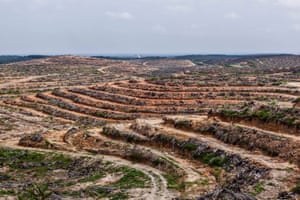https://www.theguardian.com/environment/2017/oct/27/nestle-mars-and-hershey-breaking-promises-over-palm-oil-use-say-campaigners
Nestlé, Mars and Hershey have been accused of breaking pledges to stop using “conflict palm oil” from deforested Indonesian jungles, just days before the annual Halloween confectionery frenzy.
The Rainforest Action Network (RAN) says consumers have been “deceived” by promises from the brands to clean up their supply chains which were subsequently delayed, revised or watered down.
Laurel Sutherlin, a spokesman for the group, told the Guardian: “For too many years, Nestlé, Mars and Hershey have cherry-picked their [palm oil] targets and then moved the goalposts when they don’t achieve them. There’s just no further room for error to prevent the extinction of tigers, orangutans and elephants.”
The last parcel of Sumatran rainforest in which these three species all roam – along with rhinos, clouded leopards and sun bears – is vanishing at a dramatic pace as lucrative palm oil plantations illegally eat into tropical forestland.
The brands source palm oil from this 2.6m hectare Leuser region, via complex supply chains, some involving traders linked to suppliers illegally logging in the region.
Nestlé promised to end deforestation in its supply chain by 2015 in response to Greenpeace’s KitKat campaign of 2010. After Ran’s “Snack food 20” report, this was upgraded to a pledge of “no sourcing from areas converted from natural forests after 1 February 2013”. The target was missed.
“Four years later we can now trace over 90% of our palm oil back to the mill of origin and almost two thirds back to the plantation level,” said Nestlé spokeswoman Peggy Diby. “Our ambition is to raise this figure to 100% by 2020, back to plantation.”
In July, Nestlé told the Guardian it could only source 47% of its palm oil to plantations, suggesting a big improvement in the last three months.
Hershey’s said in 2014 that it would source all of its palm oil back to the mill level by 2015, and to plantations by 2016. But its plantation level sourcing actually fell in 2016 from 27% to 14%, and the commitment has been deferred until 2020.
Jeff Beckman, Hershey’s communications director said: “While we remain deeply committed to pushing all stakeholders to accelerate traceability and bring full transparency to this supply chain along with our supplier partners, we realised it would take more time to achieve this goal than originally anticipated.”
Mars had promised to cut conflict palm oil out of its supply chain by 2015. A spokesperson said: “Our traceability levels remain high. In the year to date, 97% of our palm oil is traceable to mill level and 40% traceable to the plantation. The evidence of the challenge in Leuser is clear, and we are already taking steps toward action.”
Gemma Tillack, Ran’s campaign director said: “It is our view that the brands have deceived consumers by continually claiming to be tackling deforestation when they have not executed the actions required to achieve a moratorium on the forest frontlines of their global supply chains.”
• This article was amended on 30 October 2017 to include a response from Mars, which was supplied after publication.
Since you’re here …
… we have a small favour to ask. More people are reading the Guardian than ever but advertising revenues across the media are falling fast. And unlike many news organisations, we haven’t put up a paywall – we want to keep our journalism as open as we can. So you can see why we need to ask for your help. The Guardian’s independent, investigative journalism takes a lot of time, money and hard work to produce. But we do it because we believe our perspective matters – because it might well be your perspective, too.
I appreciate there not being a paywall: it is more democratic for the media to be available for all and not a commodity to be purchased by a few. I’m happy to make a contribution so others with less means still have access to information.Thomasine F-R.
If everyone who reads our reporting, who likes it, helps fund it, our future would be much more secure. For as little as £1, you can support the Guardian – and it only takes a minute. Thank you.


沒有留言:
張貼留言